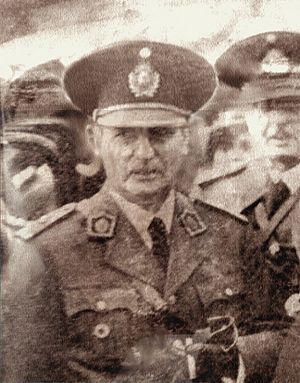Arturo Rawson facts for kids
Quick facts for kids
Arturo Rawson
|
|
|---|---|
 |
|
| President of Argentina | |
|
De facto
|
|
| In office June 4, 1943 – June 6, 1943 |
|
| Appointed by | Military junta |
| Vice President | None |
| Preceded by | Ramón Castillo |
| Succeeded by | Pedro Pablo Ramírez (de facto) |
| Personal details | |
| Born | June 4, 1885 Santiago del Estero |
| Died | October 8, 1952 (aged 67) Buenos Aires |
| Nationality | Argentine |
| Political party | Independent |
| Spouse | Delia Sixta Borda (1895–1983) |
| Profession | Military |
Arturo Rawson (born June 4, 1885 – died October 8, 1952) was an Argentine military officer and politician. He was the temporary President of Argentina for a very short time. He served from June 4, 1943, to June 6, 1943. His actions helped start a series of changes in Argentina's government. These changes led to the Labor Party coming to power a few years later.
Contents
Biography
Early Life and Military Career
Arturo Rawson was born in Santiago del Estero, Argentina, in 1885. He came from a family with roots in San Juan. Young Arturo went to Argentina’s Military College. He finished his studies there in 1905. Later, he even taught at the college for a while.
Rawson worked his way up in the Argentine Army. He became a high-ranking officer, eventually reaching the rank of general. By 1943, he was in charge of the Cavalry (soldiers who ride horses) at a place called Campo de Mayo.
The Coup of 1943
In June 1943, a group of military officers contacted Rawson. They were called the GOU, which stood for the United Officers' Group. This group wanted to take over the government. They needed more soldiers to make their plan work. Rawson had many troops under his command. He had already been thinking about overthrowing the government himself. So, he agreed to join their plan.
On June 4, 1943, Rawson and about 10,000 soldiers marched into Buenos Aires. They successfully removed the government led by Ramón Castillo. This event is known as the Revolution of '43. It also marked the end of a period in Argentine history.
A Very Short Presidency
After the coup, Rawson quickly declared himself President of Argentina. He became president before another officer, Pedro Pablo Ramírez, could. However, Rawson's choices for his group of advisors, called his cabinet, upset the GOU leaders.
The GOU wanted Argentina to stay neutral in World War II. Rawson, like the previous president, supported the Allies (the side fighting against Germany and Japan). This disagreement was a big problem. On June 7, just three days after taking office, the GOU forced Rawson to resign.
A military officer told Rawson that he was president by mistake. The real president, they said, was Ramírez. Rawson resigned and left the presidential palace, the Casa Rosada, in a military jeep. His time as president was so brief that he never even took the official Oath of office. He had the second shortest term of any Argentine president.
Life After the Presidency
After leaving the presidency, Rawson became the Ambassador to Brazil. He held this job until 1944. He even congratulated President Ramírez when Argentina ended its relations with Germany and Japan.
In 1945, Rawson was briefly arrested. This happened because he spoke out against the government of President Edelmiro Farrell. He was released quickly. In 1951, Rawson supported another general's attempt to overthrow President Juan Perón. For this, Rawson was put in prison for a short time.
Arturo Rawson also wrote a book. It was called Argentina y Bolivia en la epopeya de la emancipación. This means "Argentina and Bolivia in the Liberation epic." He passed away from a heart attack in Buenos Aires in 1952. He is buried at La Recoleta Cemetery in Buenos Aires.
See also
 In Spanish: Arturo Rawson para niños
In Spanish: Arturo Rawson para niños
 | James Van Der Zee |
 | Alma Thomas |
 | Ellis Wilson |
 | Margaret Taylor-Burroughs |

